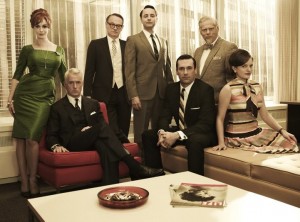What a ride the long-awaited, much-anticipated fifth season of American drama Mad Men has been. After waiting more than 18 months between seasons four and five, viewers had what might reasonably have been described as unreasonably high expectations of this season. In the end, did creator Matthew Weiner deliver? Were all of our cravings, curiosities, questions and cravings satisfied by the 13 wonderfully disparate, deeply emotional and often downright shocking episodes he gave us?
For me, watching season five was many things: enjoyable, thrilling, annoying, dismaying, disturbing and pleasurable. As I watched last week’s wrenching, emotional firecracker of a finale, despite feeling satisfied, I also felt impatient and anticipatory. Weiner, as ever, had crafted a season finale that drew together the disparate threads of the previous 12 episodes. He satisfactorily answered some questions, but also left the viewer with just as many unanswered questions, unfulfilled and longing for more. Still, if nothing else, at least we know that season six is a certainty, scheduled to screen in 2013.
At the beginning of this latest season, John Slattery’s Roger Sterling wondered: “When will everything get back to normal?” In the end, really, nobody ended up inhabiting territory that could be described as anything approximating normal. And, really, when has anything on this show ever truly been normal? Though the glossy façade of the 1950s and 1960s offers up the veneer or superficial appearance of normality, Mad Men has never been about normality.
It has always been about peeling back the layers, peering past the façades to explore the abnormalities, the inconsistencies, the bruised, broken, often soul-destroying details of what life is to this motley cast of flawed and unforgettable characters. The show’s very title, after all, is more than the sum of its parts, more than the jokey, jocular moniker of the Madison Avenue advertising men for whom it is ostensibly named.
Those two tiny words – Mad Men – are ripe with allusion and dark possibilities. Beneath the seemingly factual title are the stories of men (and the women in their worlds) whose lives are fraught, confusing and confounding, complex, dissatisfying and, yes, even at times hovering on the ever-shifting line between the sane and the insane. From its very first season, which screened in 2007, Mad Men has showed that these men, seemingly so smart, so successful, so ambitious, professional capable and personally happy, on the outside, at least, are indeed anything but.
Beneath the veneer of the slicked-back hair and the impeccably fitted suits, behind the smiles and the easy charm with which they deliver cannily apt product campaign pitches to potential clients, there exists something altogether more malevolent, something darker and baser. Their struggles are many and they’re embroiled in a near-constant fight to find their way within ever-shifting dynamics of social norms, cultural norms and ideological norms. We see, in myriad ways, and at often at unexpected junctures, just how much of a toll the actual business of life exacts from the people embroiled in the constant, unrelenting business of living it.
In many ways, this past season has taken viewers right back to the beginning with many of the dilemma’s faced by the show’s key characters. Their lives have been anything but predictable, kind, satisfying or even lived in some sort of orderly progression. Jon Hamm’s Don Draper ended the season much as he began it, feeling tethered to an old-fashioned past, a time, place and state of mind that seemed often to leave him feeling adrift in the rapidly changing personal, social, and cultural spheres of New York in the late 1960s.
Though Don has remarried his former secretary, the beautiful and much younger Quebecoise Megan, an aspiring actress, and he lives a life with all the hallmarks of material success – the sprawling, stylish Manhattan apartment and a business that is, having just signed a lucrative deal with Jaguar Motors, going from strength-to-strength – he is, in many ways, the same Don Draper we met four seasons ago: a man beset by an existential crisis that even he struggles to fully comprehend, let alone deal with.
Like most everybody on the show, he’s not above ameliorating his emotional discontent or past traumas with a bottle of scotch. Don is, despite his philandering ways and ingrained chauvinism, also incredibly self-aware in some regards. He’s recognises that success is fleeting and temporary, and that, as he says in one of his finest, most insightful professional pitches to a potential client, everybody around him more-or-less exists in a world where the joys of conspicuous success, consumption, romance, love or marriage are both key and also terribly, depressingly fleeting and impermanent. “Happiness,” he says, “is just the moment before you need more happiness.”
If Mad Men’s preceding seasons have been about gradually exposing the fallibility or fractured brokenness of the myth of the American Dream, then this season has been about offering up the bloody, broken figures whose lives have been lived with only the most fleeting moments of fulfilment. An unmistakable shadow of death, both literal and metaphoric, has hung like a grim, persistent cloud over the show’s fifth season.
Indeed, many of the characters have, in one way or another, not made much of a progression at all since we last saw them, at the end of season four, which was set in 1964. They have struggled with death in its various guises – of the self, of the soul and of their own idealism, of their own dreams or desires, of romantic relationships and marriages– but it was only in the second-last episode of the current season that anybody, whether a character on the show or a viewer at home, was brutally, inescapably made to deal with not only the death of one of the show’s main characters, but everything that that death both alluded to and embodied.
The suicide of Jared Harris’s Brit Lane Pryce came as a shock, if only because he had tried (and failed) to kill himself earlier in the episode and seemed, if only momentarily, to have resigned himself to forging ahead with the messy business of life. Fittingly titled “Commissions and Fees,” the episode showed that Lane’s suicide was born not only of his own financial misdoings, or the fact that Don had discovered them, but also of his inability to deal with having his ego savagely deflated and his sense of achievement, both personal and professional, reduced to ragged, insubstantial tatters.
To him, it was better to be found hanged in his office than to deal with the social and professional shame of having broken the law and embezzled company funds to cover personal debts. It was a brutal turn of events not only because the loss of the jovial, gentle Lane was unanticipated and genuinely saddening but also because his suicide was emblematic of everything male corporate culture, at its very worst, represented; namely, a cult of ambition that purported to be a collegial, supportive partnership but was, in the end, so dedicated to every man making it on his own terms, unaided by others. It was more acceptable, somehow, for Lane to die rather than, however shamefacedly, admit he that he had made dire mistakes and needed urgent assistance, both personally and professionally.
This season, Vincent Kartheiser’s Pete Campbell has moved into a more senior role at the ad agency of Sterling Cooper Draper Pryce and has struggled demonstrably, at times even movingly, with a profound sense of unhappiness. Promoted at work and earning more money, Weiner has spent much of the season showing that Pete’s success is a gilded cage – he has the toddler daughter, the superficially doting wife and the beautifully appointed home in the suburbs – but he’s still an insufferable prick much of the time, whatever accoutrements of wealth and success he may have amassed.
Brilliant portrayed by Katheiser, Pete’s such an asshole, really, that even in those sad, telling moments when his existential ennui is made achingly and unmistakably apparent, it’s difficult to feel any genuine empathy for him. He’s unhappy, sure, but he’s also smarmy, supercilious, obnoxious and rude. I spent most of the season, frankly, waiting for Roger Sterling to punch him. As a viewer, it’s difficult not to oscillate madly between feeling something approximating sympathy for him and then, only minutes later, recoil at his arrogance and condescension.
Some of this season’s strongest moments have come with Pete dares, however tentatively, to grapple with his fundamental discontent. Though he’s often a repulsive prig at work, away from Madison Avenue he’s genuinely miserable and thoroughly dissatisfied. His wife, Trudy, lectured him at one point, admonishingly observing that “it’s doom and gloom with you lately,” and she was right, of course.
While most other successful businessmen would see adding a pool to their backyard as an obvious status symbol, Pete saw it only through a veil of darkness. Trudy told him it would add value to the property, he saw it as a both a money pit and gaping hole in the earth, a huge grave of sorts. He would spend his evenings, alone in the living room, listening to dramatic classical music through headphones, a drink always in hand, seemingly desperate to escape the suburban hell in which he found himself inextricably mired.
In those moments, as when the woman with whom he was having an affair, and for whom he appeared to have genuine feelings, rebuffed him, it was difficult not to want to weep for him because, sure, he was an asshole, but he was also seemingly existentially doomed: he was the young man for whom everything, no matter how grand, expensive, pretty or important, was just a “temporary bandage on a permanent wound.”
As season five of Mad Men began, I wrote about Don’s daughter, Sally, and the show’s other female characters. Sally’s mother, Betty, has been notably absent for most of this year. Due to the real-life pregnancy of actress January Jones, Betty’s role was radically scaled back, leaving her making only occasional appearances at key moments, the most memorable of these probably being when Sally gets her period for the first time and the usually frosty, physically undemonstrative Betty actually cradles her daughter in her arms and comforts her.
Kiernan Shipka’s Sally has made a few small appearances throughout the season, all of them at times carefully crafted to reveal her perceptions of the difficulties and bitterness of womanhood. Though she seems a little awed by her new stepmother’s artifice and sophistication, she’s still a young girl, on the cusp of her teenage years, who orders coffee but has to add a ton of sugar in order for it to be palatable. Dressed up in a very of-the-moment outfit, complete with a short skirt and knee-high patent leather boots, with her hair and make-up done, she’s excited to accompany Don to an awards ceremony. But even he declares her ensemble inappropriate for her age, ordering her to remove the boots and the make-up.
Roger Sterling, having broken up with his much younger wife after taking LSD and realising what the rest of us knew before they were even wed – namely, that the marriage was doomed – spends the night doting on Sally, kidding that she is his date and ensuring that she never wants for pink lemonade or attention. For her, however, the fun experience is ruined when she inadvertently sees Roger getting a blowjob from Megan’s mother. She is left with the unmistakable feeling that both adulthood and New York City are, as she puts it to a friend during a telephone conversation, tarnished and “dirty.”
Womanhood has, in season five, been dirty business for all of the show’s female characters, but perhaps none more so than Christina Hendricks’ brilliant, and much under-utilised, Joan Harris. In an episode entitled “The Other Woman,” which showed the agency in the throes of professionally prostituting itself in order to represent Jaguar Automotive, Weiner and his writers did the unthinkable and also literally prostituted Joan as part of its bid to win the coveted account. “Don’t fool yourself, this is some very dirty business,” Roger said to Pete at one point and he wasn’t wrong.
Not surprisingly, then men of Sterling Cooper Draper Pryce were going after the account with their typically misogynist, chauvinistic ferocity. Their pitch likened owning a Jaguar to having a beautiful but temperamental mistress and the car, we were told, was better because, in the end, a man could “own” and “control” a vehicle in a way that he could never own a woman.
It’s an episode that bears watching for many reasons and also one that cannot fully be done justice by merely recounting plot points or musing on the finer points of character development. There is, from the opening scenes, a sense that something wretched is about to happen and, soon enough, it does, when Jaguar’s representative lets slip that he’d be willing to be award Sterling Cooper Draper Pryce the account in exchange for a night with Joan. Was it an entirely shocking plot development? No, but I nonetheless felt a sickening sense of revulsion and sickening inevitability watching the storyline unfold. It left me, in the end, wondering whether Weiner was simply hammering home the misogynistic age in which women lived or whether he, himself, is afflicted with a similarly misogynist streak.
Mad Men takes place, after all, during an era and in a business in which women were very much second-class citizens, seen by many men as little more than sexual currency. In the end, it is Lane Pryce, the man you’d have thought least likely to disrespect Joan, who overtly and unrepentantly asks her to prostitute herself by shamelessly appealing both to her ego and to her desperate need for financial security as a recently divorced, newly single working mother.
Joan bites back – telling Pryce: “And here I thought you were trying to stop this because you have feelings for me” – but she’s clearly conflicted. Yes, he’s seemingly going against some more respectable and respectful inner voice because of the financial quandary in which he finds himself, burdened as he is with tax debts and the knowledge that he’s embezzled company fund, but Joan, too, albeit in an entirely different way, hungers for financial stability and something approximating professional equality. Yes, she’s aware that neither is truly achievable by doing what is being asked of her, but her dilemma is nonetheless crystal clear: she is a single mother with a son to raise and that’s something she knows she’ll struggle to do on her office manager’s salary.
Roger’s complicity in the whole plan is unsurprising but especially disgusting, given that he does seem to actually love Joan. Love, it seems, does not equal respect in the patriarchal world of Sterling Cooper Draper Pryce. Sage old Bert Cooper, the firm’s senior partner, does nothing but purport to give Joan the right of refusal before going on to muse: “This is a car, you can’t put a dollar figure on its significance.” You can, however, apparently put a human price on the significance of the account to the firm and that human price, dismayingly and disgustingly, is Joan.
Though she has single-handedly kept the firm running for 13 years and deserves to be offered a junior partnership on those merits alone, it’s sadly emblematic of womanhood, circa 1966, that Joan is expected to spread her legs, not just for the sake of her own career advancement but for the advancement of the firm itself. “He’s not bad,” a smarmy Pete assures Joan, clearly trying to quell his own unspoken doubts about the situation. Again, Joan responds succinctly but witheringly when she tells him: “He’s doing this, isn’t he?”
Ultimately, it is only Don who demonstrates any true respect for her. Granted, Don Draper, womaniser par excellence, is hardly a male feminist, but it is he alone who opposes the odious plan, making plain his disgust at the proposition. After exiting the meeting and slamming the door, Pete, ever the self-important upstart, confronts Don and sneers: “The conversation doesn’t end just because you leave the room.” Don doesn’t punch Pete, though I found myself silently willing him to do so. Similarly, it’s difficult when pondering this entire plot point not to wonder again whether Weiner is some sort of misogynist or simply a dramatic writer striving for historical accuracy.
When Don later visits Joan at home, telling her that Jaguar is not worth her debasement, she smiles, sadly and knowingly, before touching him on the cheek and telling him: “You’re a good one, aren’t you?” It’s a scene of immense sadness and intimacy that, frankly, only becomes all the more heartbreaking and resonant when it is repeated, out of sequence, for a second time, to unsettling effect.
It is, much like the moment where Peggy Olson, Don’s protégé, decides to leave the agency and he kisses her on the hand. It is a mark of his tenderness and respect for her, neither of which he’s ever been especially good at demonstrating, but it is Mad Men at its hushed, minimalist best. Draper is imperfect, frequently impossible and often, as befits the show’s title, maddening. But he also has a soul and, in these rare and unsentimental moments, he’s unafraid to show it.
Though Joan and Peggy have sought, at different times, to assert themselves, both striving for respect and autonomy, the fifth season of Mad Men ultimately did little to improve the state of affairs for its women characters. Yes, Peggy left the agency and gained a promotion in accepting a new job, but whether or not that decision will work in her favour is yet to be revealed.
This season’s portrayal of the women of Mad Men could simply be indicative of the era in which it takes place, of course, but even taking that into account, there were few moments over the course of its 13 episodes in which the fetishisation and reduction of women to little more than sex toys, docile wives or children, and second-class citizens, was as expertly, wrenchingly demonstrated as that moment when the man from Jaguar touches Joan and pain and repulsion wash unmistakably across her face.
Yes, she’s now in partnership with a group of powerful Madison Avenue advertising executives, but where once there was the sense that they actually respected her professional talents and abilities, at what price has that partnership come? She will, henceforth, no matter how capable and gifted she is, always be the woman who slept with a client in order to guarantee her financial stability. That alone will, evermore, ensure that the majority of men with whom she works, and who were complicit in the deal, view her as a mere commodity, something to be traded or sold.
When Don pitches to Jaguar, even he sells the car from the perspective of a chauvinist: “Oh, this car, this thing, gentlemen, what price would we pay, what behaviour would we forgive? If they weren’t pretty, if they weren’t temperamental, if they weren’t beyond our reach and little out of our control, would we love them like we do?” He’s talking about a car, yes, but he’s also talking about the society in which he lives and its prevalent attitudes towards women.
As such, the season ends much as both it, and the show as whole, began. Don Draper is by turns inscrutable and utterly transparent, occasionally chivalrous but also frequently chauvinistic. How far into the future, one wonders, will Weiner and his team of writers choose to set the sixth season of this much-lauded show?
One hopes, watching the closing scenes of the final episode of season five, in which Draper drinks an old-fashioned as Megan shoots a television commercial in the background, that by the time Mad Men returns in 2013, the 70s might have dawned and that, at last, the women, whether it’s Betty, Joan, Peggy, Megan or Sally, will be given what they most deserve and most need: the mere possibility of something potentially life-changing – something called, for no small reason, ‘choice.’
Heidi Maier




